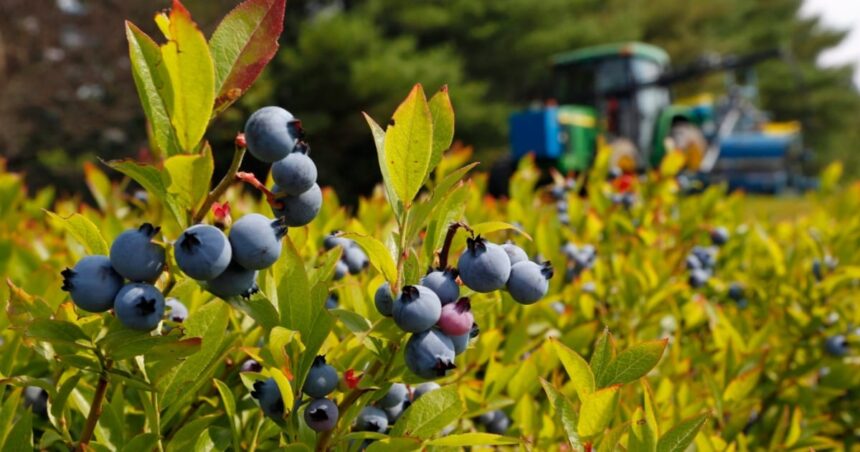As the summer warmth gives way to the crisp morning air of autumn, a quiet conflict is brewing along the Atlantic provinces that threatens a generations-old tradition for Mi’kmaw harvesters. The annual wild blueberry harvest, a cultural and economic cornerstone for Indigenous communities in Nova Scotia, faces unexpected pressure from recent Canada-U.S. trade tensions.
Standing among the rolling hills of Cumberland County, Albert Paul adjusts his berry rake with practiced hands. “My grandmother taught me to harvest these fields when I was just seven,” he tells me, surveying the landscape that has sustained his community for generations. “Now I worry if my grandchildren will have the same opportunity.”
The worry isn’t without cause. Wild blueberry exports to the United States – which typically account for nearly 70% of Nova Scotia’s harvest – have declined 23% since new informal trade barriers emerged last spring, according to figures from the Wild Blueberry Producers Association of Nova Scotia.
For Mi’kmaw harvesters like Paul, who represent approximately 15% of the province’s seasonal berry workforce, these economic ripples threaten both income and cultural practice. Many Indigenous families rely on the eight-week harvest season to supplement their annual income by as much as $6,000 to $8,000.
“This isn’t just about money,” explains Elder Mary Sylliboy from We’koqma’q First Nation. “Harvesting blueberries connects us to our land and teaches our young people traditional values of patience and respect for what the earth provides.”
The trade complications stem from what Canadian officials describe as “regulatory overreach” following minor disputes over labeling standards and organic certification processes. While not a formal tariff, U.S. border inspections of Canadian berry shipments have increased threefold, creating costly delays for perishable products.
Nova Scotia Agriculture Minister Greg Morrow acknowledges the situation’s impact on Indigenous harvesters. “We’re working closely with federal counterparts to resolve these issues quickly,” he said during a recent press conference in Halifax. “The Mi’kmaw contribution to our agricultural sector deserves protection and respect.”
The Department of Agriculture has allocated $1.2 million toward an emergency stabilization fund for affected producers, but community leaders worry this won’t adequately address Indigenous harvesters’ unique position in the industry.
Chief Deborah Robinson of the Acadia First Nation points to deeper historical context. “Our people have harvested blueberries on these lands since time immemorial. Now we navigate modern trade disputes while still fighting for basic recognition of our harvesting rights in some areas.”
The tension highlights the complex intersection of Indigenous rights, international trade, and rural economics that often goes unnoticed in broader policy discussions. When diplomatic disagreements occur at federal levels, the consequences frequently land hardest on communities already navigating economic margins.
At processing facilities like Oxford Frozen Foods, the largest wild blueberry processor in North America, operations have slowed noticeably. Line worker Jessica Martin has seen her hours cut by nearly 30%. “Everyone’s nervous,” she explains during her lunch break. “When the berries don’t move across the border, nothing here moves either.”
For perspective on the broader economic picture, I spoke with Dr. Sylvain Charlebois, director of the Agri-Food Analytics Lab at Dalhousie University. “Wild blueberries represent a $35 million industry for Nova Scotia, but their cultural significance extends far beyond market value,” he notes. “The Mi’kmaw relationship with this harvest embodies sustainable practices that predate modern agriculture by centuries.”
Community-led solutions are emerging amid the uncertainty. The Ulnooweg Development Group has launched a pilot program to explore domestic market alternatives, including partnerships with Indigenous-owned businesses across Canada to develop value-added products from wild blueberries.
“We’re looking at creating our own supply chains,” explains John Paul, executive director of the Atlantic Policy Congress of First Nations Chiefs. “This situation reminds us why economic sovereignty matters for Indigenous communities.”
Meanwhile, in the fields outside Parrsboro, seasonal workers continue the methodical work of harvest. The distinctive swish-scrape rhythm of berry rakes combing through low-growing plants punctuates conversations about market prices and border politics.
Young harvester Keisha Bernard, 19, represents the new generation learning traditional practices. “My uncle says we’ve faced worse than trade problems,” she laughs, emptying her rake into a collection bucket. “The Mi’kmaq have harvested these berries through everything from colonization to climate change. We’ll adapt to this too.”
Federal officials from Global Affairs Canada indicate diplomatic conversations are ongoing, with hopes for resolution before next year’s harvest season. However, many producers fear permanent damage to market relationships if the situation continues through winter.
As darkness falls over the blueberry barrens, Albert Paul packs up his equipment for the day. His harvest tally is lower than in previous years, but his determination remains unshaken. “These berries fed my ancestors during hard times,” he reflects. “They’ll see us through these challenges too.”
The struggle of Mi’kmaw blueberry harvesters reminds us that international trade disputes, often discussed in abstract economic terms, create very real ripples through communities whose connections to land and traditional practices remain vital to both cultural identity and economic survival.
For now, the community waits – hands stained purple from the day’s work – hoping that diplomatic solutions will arrive before the first snow covers the fields that have sustained generations of Mi’kmaw harvesters through changing seasons and changing times.






